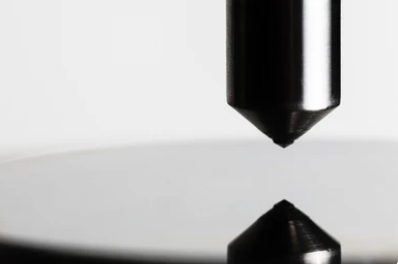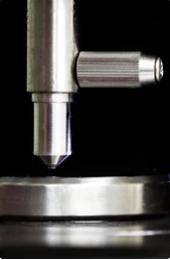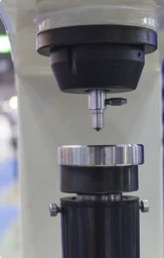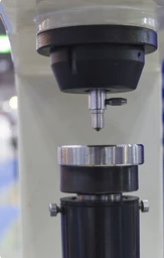
Hardness Testers
Hardness testing equipment is utilized to determine the resistance of a material to indentation or deformation, providing insights into its mechanical properties such as strength, wear resistance, and ductility. Various methods and instruments are employed for hardness testing, each suited to specific materials, applications, and testing requirements. Lincoln Structural Solutions offers a wide array of testing options.
- Rockwell HR A / B / C Hardness Scales
- Vickers Microhardness
- Calibrated Test Blocks
- Testing in accordance with ASTM E18 / ISO 6508
- Load Cell Controlled
- NVLAP Certified Diamond and Ball Indentors
Rockwell Hardness Tester:
- Principle: Rockwell hardness testers measure the depth of indentation created by an indenter under a specific load, with different scales available for various materials and hardness ranges.
- Applications: Widely used in manufacturing, quality control, and materials research across industries such as automotive, aerospace, and metallurgy.
- Scales A/B/C
Vickers Hardness Testers:
- Principle: Vickers hardness testers determine material hardness by measuring the size of an indentation produced by a diamond pyramid-shaped indenter under a specific load.
- Applications: Ideal for precision testing of metals, ceramics, and composites in research, quality control, and forensic analysis.
Shore Hardness Testers:
- Principle: Shore hardness testers measure the resistance of flexible materials to indentation using a spring-loaded or sharp-pointed indenter.
- Applications: Commonly used for testing rubber, elastomers, plastics, and other soft materials in industries such as polymer processing and manufacturing.
Microhardness Testers:
- Principle: Microhardness testers evaluate the hardness of small or thin samples using precise instruments and low loads.
- Applications: Used in microstructure analysis, quality control of thin films, coatings, and semiconductor materials.
Durometer Hardness Testers:
- Principle: Durometer hardness testers determine the hardness of materials by measuring the depth of indentation using a spring-loaded or sharp-pointed probe.
- Applications: Commonly used for testing the hardness of rubber, elastomers, and plastics in material processing and product development.



